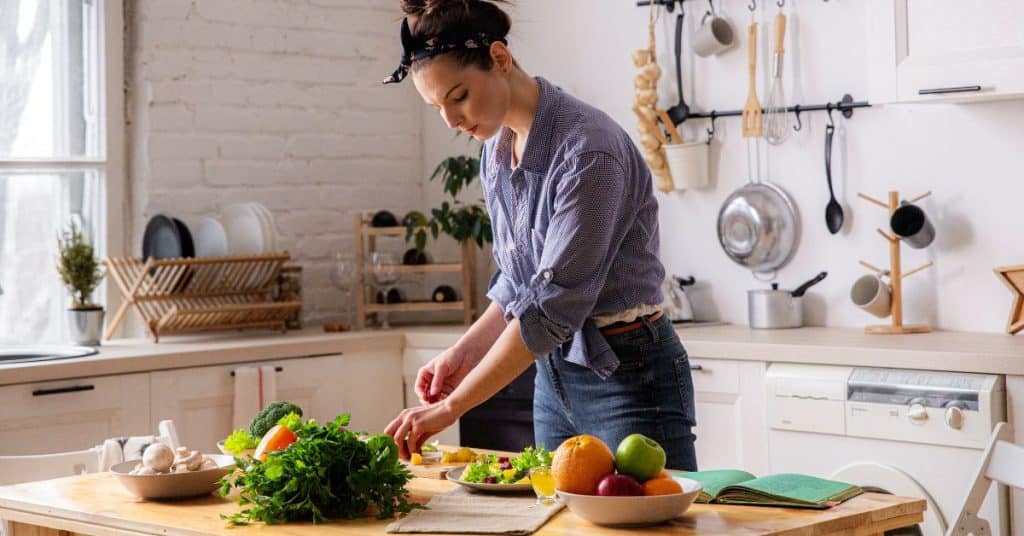

Not long ago, I sat down to have a meal with a group of friends. Everyone at the table had a plate of healthy vegan food before them—generously provided by the robust buffet at the side of the room. Before I had a chance to take my first bite, one of the people at our table tore into their food in a frenzy—not unlike a fierce lion having its first meal in a week. I was surprised by the intensity with which they shoveled in mouthful after mouthful, and I could tell by the glances of others at the table that my reaction was not unique.
My gut response was a complete loss of appetite. I tried turning my attention inward to honestly appraise what I was feeling. What resurfaced for me were some deep-seated scars from my past, as I have a long—though now distant—history of struggles with food, weight, and trying one diet regimen after another to get a grip on the problem. I could remember eating meals in the same frenzied fashion that I was now observing. It was always associated with a period of restrictive eating, during which my attempt to control the quantities or types of food I ate—even within my veg guidelines—built up a wall of deprivation-driven tension and obsession with my “free foods” list—the foods that wouldn’t make me fat. It was also always accompanied by painful anxiety as I measured my plate against my dietary ideal, preoccupied with the results I looked forward to down the road while completely obscuring the pleasure of the present eating moment.
Perhaps, I thought, this person hadn’t had anything decent to eat in a couple of days. Perhaps they were really hungry. Noting an impulse to judge, I decided to reserve judgment.
As it turned out, the scenario repeated itself at another meal with the same person the following day. The experience inspired me to think more about our collective healthy eating quest and something else, which I hadn’t quite been able to put my finger on until that day: We seem to be on a perpetual crusade for superior health, a better body, and longevity. We measure progress by the next pound lost, the next mile we plan to run, and the next meal “in compliance.” Yet for all our striving to not die, to live forever—or at least live to one hundred—we so often neglect key parts of the Blue Zone zeitgeist, which include presence, connection, joy, love, and pleasure. A lack of presence—on the walk, at the meal, with others and ourselves—keeps us from experiencing the very satisfaction and happiness we seek. It’s as if meals have become an assembly of items on our healthy-living checklist as we paddle forward toward a perfect-on-the-charts destination that we never really arrive at.
If we are perpetually on our way toward a perfectly healthy future, when will we ever take the time to enjoy where we already are? If we view every eating experience through a food-as-medicine lens, do we risk undermining our present experience? Do we risk eventually viewing the plate as something like a pill bottle?
Nutrition research has become reductionist, as underscored so brilliantly in Dr. T. Colin Campbell’s Whole. The same reductionism has infiltrated many of us, too, and our approaches to health. We have become obsessed with the details of our lifestyles. We act as though we will have the body, energy, and health we so deeply desire if only we can get the right combination of elements in place.
I’m not questioning the importance of optimal nutrition or the science supporting it. Rather, I believe we could take a closer look at our attitudes and perspectives. What is on our plates and in our exercise plans surely make a difference in health, well-being, and longevity, but so does the atmosphere within which we engage with these critical tools of healthy living. When we practice conscious presence and cultivate connection and love in the eating environment and in our lives, we more directly, immediately access the healthy state toward which we always seem to be striving.
Maybe this isn’t news to you. I’m certainly not the first to highlight the importance of stress reduction, support, and positive relationships. But maybe now is a good time to open your heart and mind to how these are actually playing out, or not playing out, in the context of your life. How many of your meals are you taking in anticipation of some healthy outcome down the road, and how often are you opening yourself up to the full experience and pleasure of eating? How often during the day are you doing something just to get to something else? When I finish my exercise, then I can . . . When the dishes are done, I’ll be able to . . . After lunch, I can . . .
If that sounds like you, know that you’re not alone. Almost everyone can benefit from focusing more on enjoying themselves in the present moment. The following five tips are some of my favorites for recentering the mind and cultivating a happier, healthier present.
Health is not just something down the road. It’s not just a state to reach or a place to arrive at. Health is a state of mind that naturally invites skillful choices in the moment and connection with the present. So don’t miss a minute of the delicious meal right in front of you. Practice being healthy and happy, here and now.
Copyright 2025 Center for Nutrition Studies. All rights reserved.